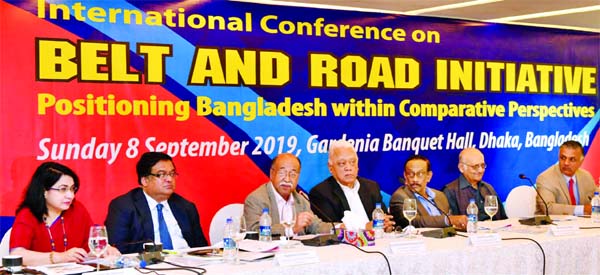
Bangladesh should take a cautious approach in accepting the development assistance from China so that it may not fall into the Chinese ‘debt trap’, said experts.
They said, a surge in Chinese development finance under the ‘Belt and Road Initiative’ could expose Bangladesh at risk of default though the initiative may be paved the way for a greater development and economic opportunity here.
Experts came up with the observation at an international seminar titled, “Belt and Road Initiative: Positioning Bangladesh within Comparative Perspective,” held at a city hotel on Sunday, organised by the Center for Policy Dialogue (CPD).
“Bangladesh may stand to benefit enormously when projects under the Belt and Road Initiative (BRI) are completed. But, we should take special care on loans to be taken in implementing the BRI projects, with capacity of repayment in mind,” said Dr Fahmida Khatun, while presenting the keynote at the seminar.
Bangladesh joined the BRI during Chinese President Xi Jinping’s visit to Dhaka in 2016. The initiative aims to rebuild the old Silk Road to connect China with Asia, Europe and beyond through massive infrastructural spending.
Once the BRI is implemented, Bangladesh will be linked by land through the corridor to the Chinese mainland which will then lead to connectivity through the other corridors to the rest of the world.
“We should also properly assess the conditions of the loans under BRI, ensure proper planning and implementation of BRI projects and those will have to adhere to strict international standards in quality along with transparent tender process,” Dr Fahmida Khatun said.
She further noted that Bangladesh should not accept costly loans under the BRI. “We may not accept project financing
at 3 per cent, it should be below 1 per cent so that we do not plunge into debt trap.
“So, the government policy-makers should engage a cautious approach on Chinese borrowing keeping future debt management and sustainability in mind.”
Speaking on the occasion, CPD Chairman Prof Rehman Sobhan said, “BRI is very important for Bangladesh. China is investing in Bangladesh under the initiative and the investment will increase in the future. So, there is need for a broader discussion on the benefits of BRI.”
He also mentioned that Bangladesh should care about its relationship with neighbours while implementing the BRI projects. Besides, it should think about the equal benefit of all BRI projects. At the same time, Bangladesh should consider its capacity while taking loans under the initiative.
Industries Minister Nurul Majid Mahmud Humayun said “BRI is “significant” for Bangladesh which he said has “multidimensional economic ties with China”.
He termed it an “emerging opportunity” and said “lots of efficient activities” are needed to seize that opportunity.
“We have to ensure win-win cooperation with China and other countries while implementing BRI projects,” he said.
Speaking at the seminar, Foreign Secretary Md Shahidul Haque said Bangladesh has not confined itself to BRI only. “We are looking beyond,” he said, referring to Bangladesh’s joining the Washington’s Indo-Pacific Strategy in this region.
He said Bangladesh will be joining to all initiatives “as long as it serves our interest”.
“We’ll try to avoid to joining to any military alliance,” he said, adding, “When we negotiate, we think for the national interest first… Nothing else.”
Chinese expert Prof Cheng Min of the Institute for Bangladesh Studies of the Yunnan Academy of Social Science, Kunming, however, said the BRI has provided “good conditions” for the establishment of the China-Bangladesh free trade area.
“On this basis, China and Bangladesh still need to make continuous efforts to take positive measures,” she said.
Taking part in the discussion, Prof Sachin Chaturvedi, Director General of India’s Research and Information System for Developing Countries (RIS), highlighted the flaws and concerns of the initiative as he saw it as an “alternative development cooperation” model.
“BRI is being viewed as a development initiative as participating countries are benefiting from investments by China in infrastructure projects,” he said.
But he said, in practice countries “often fail to negotiate a good contract that respects their own development priorities and get trapped in the undisclosed and stringent terms of conditions.
“Even resistance grows to BRI projects in partner countries. For instance, Myanmar is willing to scale down the Kyaukpyu Port amid concerns over mounting debt.
“Likewise, there were protests over local employment in Thailand and Lao PDR in the high speed rail project. Sri Lanka’s disappointment with Hambantota Port is widespread now. This has perhaps the reason that led Sri Lanka to invite India and Japan for joint development of Colombo Port,” he said.

